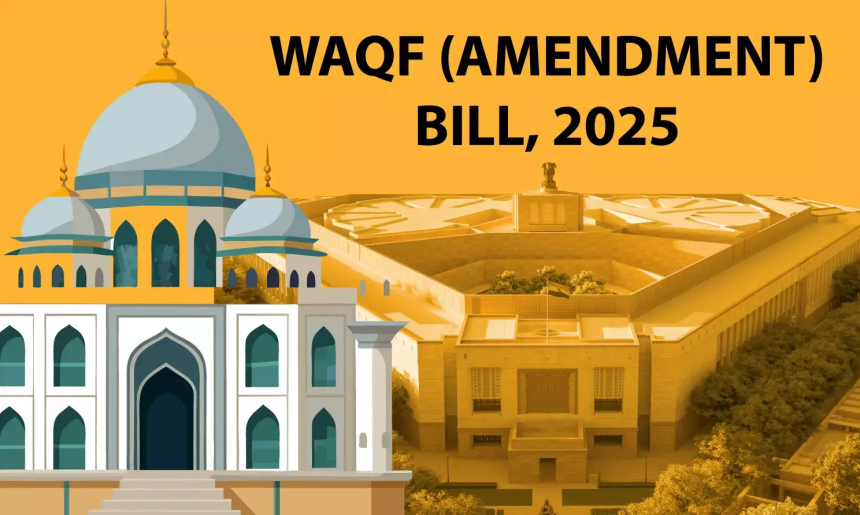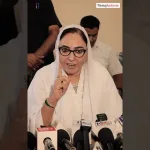WAQF AMENDMENT BILL
In the ever-evolving landscape of Indian governance, the recent passage of the Waqf (Amendment) Bill in the Lok Sabha marks a significant step in the modernization and reform of religious and charitable land management. Waqf, an institution rooted in Islamic tradition represents a unique category of property dedicated to religious, educational and social causes. Over the years however the management of Waqf properties has been marred by inefficiency, lack of transparency and misuse.
In this context, the amendments proposed by the bill are both timely and necessary offering a progressive approach to governance that seeks to address long-standing issues of accountability and misuse. While the bill has drawn sharp criticism from some quarters, particularly from opposition parties and sections of the Muslim community it is essential to engage with the substance of these changes rather than succumb to the politics of protest.
The Waqf institution, by its very nature involves trust – a trust that the resources will be used for the betterment of society. But what has been abundantly clear is that this trust has not always been upheld. Reports of mismanagement, corruption and lack of accountability have plagued the functioning of Waqf boards across the country.
According to estimates, Waqf properties in India span nearly 940000 acres of land making the Waqf board one of the largest landowners in the country. Yet these properties have often remained neglected or have been improperly utilized. In such circumstances the introduction of reforms through the Waqf (Amendment) Bill 2024 should be viewed not as an encroachment on religious autonomy but as an imperative for greater transparency, improved administration and optimal use of resources.
One of the central provisions of the bill which has generated considerable debate is the proposal to introduce representation of non-Muslims and Muslim women in Waqf boards. This move intended to promote inclusivity and diversity is an important step towards ensuring that Waqf management is not an insular, opaque institution but one that reflects the broader social fabric of India.
Far from undermining the autonomy of the Muslim community this provision ensures that Waqf boards operate in a manner that is representative of the multi-faith, pluralistic nature of Indian society. In a democracy, the inclusion of diverse perspectives in governance structures is not only a reflection of political maturity but also an essential safeguard against the concentration of power and potential exploitation.
Equally crucial is the bill’s attempt to streamline the ownership of Waqf properties. By empowering the government to resolve disputes regarding the status of Waqf properties, the bill seeks to put an end to the ambiguity that has long shrouded the classification of land. The reality that government properties have often been incorrectly classified as Waqf land or vice versa is a problem that has led to innumerable legal battles and administrative hurdles.
The bill seeks to rectify this by granting the government the authority to examine the validity of such claims and where necessary correct the record. This is a vital step in ensuring that Waqf lands are used solely for their intended purposes and not diverted for political or commercial gain. Furthermore the centralization of decision-making in this regard ensures that there is a uniform process across the country preventing discrepancies in the treatment of Waqf properties from state to state.
The bill also proposes a much-needed reform in the financial management of Waqf properties calling for greater government oversight in terms of audits, registration and publication of accounts. This measure seeks to address the most pernicious problem facing Waqf institutions today that of financial mismanagement. The appointment of an independent auditor from the Comptroller and Auditor General’s office will ensure that Waqf boards are held to rigorous standards of accountability.
These measures will not only bring Waqf management in line with best practices in public governance but will also reassure the public that their contributions to religious and charitable causes are being properly utilized. In a country where faith-based institutions often rely on donations this move towards fiscal transparency is a sign of responsible governance.
The introduction of the Waqf (Amendment) Bill, 2024, should also be seen in the context of the Indian government’s broader agenda of economic reforms and modernization. The management of religious properties which in many cases constitute vast tracts of land has implications far beyond the religious domain.
Effective management of these resources can lead to their optimal use for educational, healthcare and social welfare purposes. By ensuring that Waqf boards are better equipped to manage their assets the bill lays the groundwork for a more efficient and sustainable use of land that can contribute to the public good.
Opposition to the bill has been vocal with critics claiming that it infringes upon the rights of Muslim communities and interferes with the internal affairs of religious institutions. However, such critiques often overlook the broader context in which these reforms are being implemented. The governance of Waqf properties like any public institution must be subject to scrutiny and oversight.
The notion that religious institutions should operate in a vacuum, free from any form of accountability or oversight, is an outdated and regressive perspective. The Waqf (Amendment) Bill seeks to modernize and professionalize Waqf governance, ensuring that these institutions function transparently, effectively and in the best interests of society at large.
Today the Waqf (Amendment) Bill represents an important step towards reforming an antiquated and often mismanaged system. It aims to enhance transparency, inclusivity and accountability in the management of Waqf properties, ensuring that these lands are used for their intended charitable and religious purposes.
The bill is not a move to undermine religious autonomy but rather to ensure that the vast resources of Waqf properties are managed in a way that benefits society as a whole. It is crucial to recognize that this bill is fundamentally pro-poor and pro-Muslim community.
(The author is a Chevening Scholar and is based in Kashmir)








